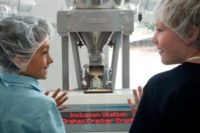
The global cocoa industry is coming together to help fight Ebola in West Africa.
The World Cocoa Foundation recently announced a $600,000 donation to help fight Ebola in the region, which is where most of the world’s cocoa supply comes from.
Seventy percent of the world's cocoa supply originates in West Africa, though the region's largest producers of the commodity, Côte d'Ivoire and Ghana, have thus far not experienced an outbreak of the Ebola virus.
"The spread of Ebola is a serious concern to WCF and our member companies, given our deep and longstanding support for the well-being of West African cocoa-growing communities,” says Bill Guyton, president, WCF.
The money was solicited from WCF member companies in the chocolate and cocoa industry. And, 100 percent of the funds raised will go to support Ebola care and prevention efforts being carried out in West Africa by the International Federation of Red Cross and Red Crescent Societies and Caritas.
"WCF will activate our existing networks in West Africa to educate rural communities about preventive measures that they can take to avoid infection,” Guyton says. “We also believe that the best way to help West African cocoa farmers and their communities is to continue to buy the cocoa that they grow."
The WCF effort was spearheaded by a $100,000 initial contribution by the Transmar Group. Other contributing members to date include ADM; Blommer Chocolate Co.; Carletti; Chocolove; Cococo Chocolatiers Inc.; Confiseur Laederach Group; Ghirardelli Chocolate; Guittard Chocolate; Fazer; Indcresa; Manufacturing Confectioner; Mars, Inc.; Mitsubishi; Mondelez International Foundation; Nestlé; Noble Resources; Olam; Purdy's Chocolatier; Sucres et Denrees; The Hershey Co.; Toms Group; and World's Finest Chocolate.
"As an industry, we care very deeply about the well-being of cocoa growing communities across West Africa," says Jean-Christophe Flatin, global president of Mars Chocolate, which donated $100,000 to the effort. "Mars Chocolate is a Principles-based, family-owned company. Because of those principles, we have made a commitment to help communities that have faced some very serious challenges, as West Africa is today.”
The donations will support the International Federation of Red Cross and Red Crescent's regional prevention and treatment programs, as well as work being done by Caritas to widely share prevention messaging, provide general health services, and deliver social and economic support to those living with or affected by Ebola.
"More than 4,000 Red Cross volunteers and 150 international staff have been on the front-lines of the Ebola crisis, educating people to prevent infections, treating those that have fallen ill, providing safe and dignified burials for those who have succumbed to the outbreak, and so much more," says Joelle Tanguy, under-secretary general, humanitarian values and diplomacy, International Federation of Red Cross and Red Crescent Societies. "It will take even more to stall Ebola and time is of the essence. Thanks to the generous World Cocoa Foundation contribution, we will be able to meaningfully accelerate progress against the deadly virus."
Jann Sjursen, secretary general of Caritas Denmark, says Ebola continues to kill people everyday in West Africa.
“Action is needed now to stop the spread of the disease, save lives and support people living with and affected by the Ebola virus,” Sjursen explains. “The initiative of WCF to support Caritas and the International Federation of Red Cross and Red Crescent Societies is a concrete example of industrial corporate social responsibility for the benefit of those who daily are battling with the devastating effects of the Ebola virus."
The WCF is an international membership foundation of more than 115 companies that promotes a sustainable cocoa economy by providing cocoa farmers with the tools they need to grow more and better cocoa, market it successfully, and make greater profits.
WCF's membership includes cocoa and chocolate manufacturers, processors, supply chain managers, and other companies worldwide, representing more than 80 percent of the global cocoa market.





